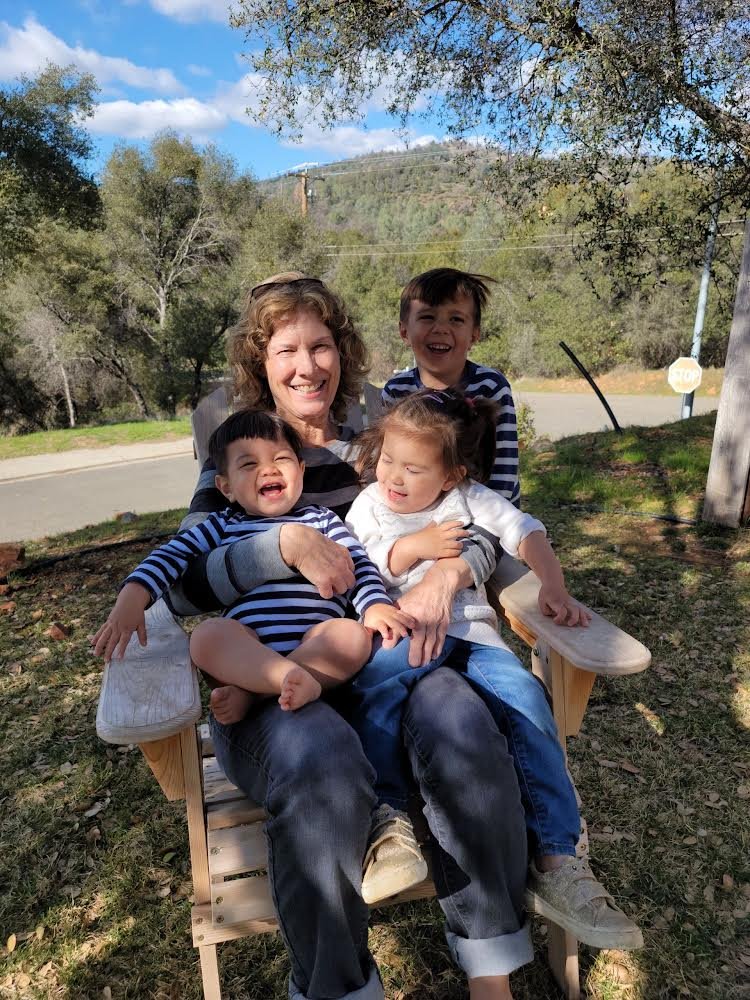Clinician Spotlight: Calle Wieg, LMFT
Internal Family Systems SM (IFS) therapy, developed by Richard Schwartz Ph.D., is more than just a method — it is a paradigm-shifting approach for deeply understanding and appreciating every part of ourselves. The IFS framework encourages a gentle inquiry that allows us to understand ourselves, our families, and our world in a new and holistic way.
The IFS Telehealth Collective is delighted to introduce you to Calle Wieg, LMFT, who is now accepting clients in California. From the foothills of the Sierra Nevada mountains, Calle shares her sense of adventure and what guides her as a therapist.
Q: How would you describe your approach in working with clients?
CW: The client sets the pace of sessions and I follow their lead, diving deeper at times, and guiding gently. I see my role as creating a safe and nonjudgmental space for people to process their life experiences. Listening deeply comes easily to me and I listen and observe to learn from my clients and about my clients. Often, as their stories unfold in this atmosphere of curiosity and encouragement, what was once complicated and confusing becomes clear and cohesive. I have clients who say, “I don’t know how or why I feel better, but I do!” Therapy is a process that takes several ingredients, the main one being the relationship between the client and the therapist. It’s my job to stay open, curious, compassionate and attuned. The client has everything else on board to facilitate their healing.
Q: Do you have a favorite TED Talk or Podcast?
CW: “Animal Tales from Icy Wonderlands” by Paul Nicklen. I have loved this TED Talk since I first saw it in 2012, but now it means more to me because of my knowledge of IFS and parts. If you take the time to watch this TED Talk, pay special attention starting at the 10:00 minute mark. Paul describes entering the Antarctic waters with a known predatory seal - the leopard seal. Paul’s curiosity and desire to learn the true nature of this animal results in amazing interactions between them. Once thought to be vicious, the seal instead showed its care-taking characteristics. It’s a lesson in parts’ behaviors!
Q: How would you describe your professional background? Do you have any specific areas of interest?
CW: Following my graduate studies I interned in a county behavioral health center and in a group/solo therapy practice. Many of my supervised hours were gained in elementary school settings which gave me opportunities to work not just with students but with their families. After licensure in 2016, I continued in the group/solo practice as well as established my own private practice. Halfway through 2020, during the first year of the Covid-19 pandemic, I focused solely on my private practice. Individuals of all ages as well as couples and families have made up my clientele. I particularly enjoy working with women in all stages of life who are in the process of becoming authentic, passionate individuals.
Q: Would you like to give a shout-out to any particular parts in your internal system?
CW: I have a part that really loves nature and the great outdoors. This part is awed by sunsets, sparkling mountain lakes, intense blue skies, soft breezes, and snow that covers everything in a blanket of white. Hiking on a backwood trail, at Yosemite National Park in particular, or sitting on a coastal beach staring at the constant motion of turbulent waves for unnoticed amounts of time will always bring this part peace, contentment, and joy.
Q: Finish this sentence: Therapy is for you when…
CW: …you go for your annual physical check-up! Wouldn’t it be amazing if we had a yearly mental health check-up? I hope for the day when our mental and emotional health is on par with our physical health. Depression and anxiety inventories can be just as routine as a blood panel. Let’s move past the practice of mental health being addressed only when there is a crisis and bring it into the realm of everyone’s yearly health check-up.
Q: What makes IFS special to you?
CW: IFS is special to me because it aligns with my personal perceptions and beliefs about mental health. IFS is non-pathologizing, meaning we don’t have to give individuals a diagnosis in order to help them feel better. IFS is based on multiplicity or parts. Everyone can relate to having different parts that carry different beliefs and adaptive ways of behaving in the world. IFS therapy offers relief to burdened parts and creates opportunities for these parts to then become integrated and valued in the internal system. IFS therapists follow their clients’ lead to explore their parts, develop relationships with them, give their parts an opportunity to release long-held burdens, and even discover new and exciting pursuits. What is there not to like about that? My parts definitely like the IFS model!
Q: Favorite Book(s)/ Therapy Resource(s)?
CW: Reading outdoor adventure books where I learn about human behavior in adverse conditions is appealing. Tommy Caldwell’s Push; Deep Survival by Laurence Gonzales; The Impossible Climb by Alex Honnold; El Capitan, and The Climbing Life, by Mark Synnott; Touching the Void by Joe Simpson; The Climb by Anatoli Boukreev; and Savage Summit: The Life and Death of the First Women of K2 by Jennifer Jordan are recent reads.
Q: What is your go-to method of accessing Self energy?
CW: The first step for me is focusing my awareness on my own system - noticing what’s happening in my body or in my thoughts. Second, I ask the current conversation in my head or sensation in my body to give me some space and I take a moment to breathe. Sometimes that means stepping outside to take in some fresh air. Once I’ve gained some internal space, I’m able to access Self and see the situation from a place of wisdom and generosity, both towards myself and others. Sometimes I have to do this more than once if a part is tenacious in sharing its perspective!
Q: Favorite Quote?
CW: Jack Kornfield said “Though it sounds simple, letting go is an advanced practice. It is demanded in the greatest trials of our lives and in our final moments. It is here that the heart learns the secret: that to let go is also to embrace what is true.”
Q: Will you share a fun fact about you with our readers?
CW: During the summer of 2011, I hiked 80 miles of the Pacific Crest Trail with my family. We were in the wilderness for 8.5 days and carried everything we needed on our backs. We saw some spectacular scenery, bathed in some incredibly cold streams, and discovered some previously unknown strengths. Memories were created that will last a lifetime!
Does Calle Wieg, LMFT sound like the therapist to guide you on your journey of Self-discovery? If you are based in California, contact our Client Care Coordinator or call 503-447-3244 to schedule a consultation.
In the meantime, subscribe to our newsletter for updates and to receive a free copy of The Unburdened System Mandala. Don't forget to follow us on social media: Facebook, Instagram, and LinkedIn.



